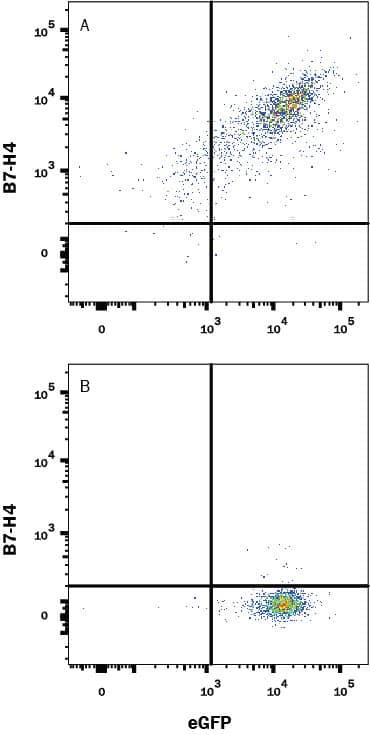Mouse B7-H4 Biotinylated Antibody
R&D Systems, part of Bio-Techne | Catalog # BAF2154


Key Product Details
Species Reactivity
Validated:
Cited:
Applications
Validated:
Cited:
Label
Antibody Source
Product Specifications
Immunogen
Phe29-Pro258
Accession # Q7TSP5
Specificity
Clonality
Host
Isotype
Scientific Data Images for Mouse B7-H4 Biotinylated Antibody
Detection of B7-H4 in HEK293 Human Cell Line Transfected with Mouse B7-H4 and eGFP by Flow Cytometry.
HEK293 human embryonic kidney cell line transfected with either (A) mouse B7-H4 or (B) irrelevant protein and eGFP was stained with Goat Anti-Human/Mouse B7-H4 Biotinylated Polyclonal Antibody (Catalog # BAF2154) followed by APC-conjugated Streptavidin (F0050). Quadrant markers were set based on Goat IgG control antibody staining (Catalog # BAF108). View our protocol for Staining Membrane-associated Proteins.Applications for Mouse B7-H4 Biotinylated Antibody
Flow Cytometry
Sample: HEK293 Human Cell Line Transfected with Mouse B7-H4 and eGFP
Western Blot
Sample: Recombinant Mouse B7-H4 (Catalog # 2154-B7)
Formulation, Preparation, and Storage
Purification
Reconstitution
Formulation
Shipping
Stability & Storage
- 12 months from date of receipt, -20 to -70 °C as supplied.
- 1 month, 2 to 8 °C under sterile conditions after reconstitution.
- 6 months, -20 to -70 °C under sterile conditions after reconstitution.
Background: B7-H4
B7-H4, also known as B7x and B7S1, is a member of the B7 family of immune co-stimulatory proteins (1). Mature B7-H4 is a 50 kDa - 80 kDa glycosylated molecule with a 28 kDa protein core (2). Partial sensitivity to cleavage by PI-PLC suggests a possible GPI linkage of mouse B7-H4 to the cell membrane (3). The 230 amino acid (aa) extracellular region of B7-H4 contains one Ig-like V-set domain and one Ig-like C2-set domain which is followed by a hydrophobic C-terminal region (3 - 5). Within the ECD, mouse B7-H4 shares 90% and 99% aa sequence identity with human and rat B7-H4, respectively. It shares 21% - 29% aa sequence identity with B7-1, B7-2, B7-H1, B7-H2, B7-H3, and PD-L2. B7-H4 expression is induced on mitogen- or LPS-activated B cells, T cells, dendritic cells, monocytes, and macrophages (3, 4) and blocked by GM-CSF or IL-4 (6). It is also expressed on various normal epithelia and upregulated in several carcinomas and renal tubule epithelial cell lesions (2, 6 - 10). B7-H4 is expressed on the surface of macrophages but intracellularly in ovarian and breast cancer cells (2, 6 - 7). It is found in the serum and ascites fluid of cancer patients (11). B7-H4 binds an unidentified ligand on activated T cells which is distinct from BTLA, CD28, CTLA4, ICOS, and PD-1 (3 - 5, 12). Exposure to B7-H4 inhibits antigen-dependent induction of T cell proliferation and activation (3 - 5). Alternatively, B7-H4 expressing renal tubular epithelial cells promote T cell activation (8). Regulatory T cells, IL-6, and IL-10 induce B7-H4 expression on antigen presenting cells which fosters tumor growth by dampening the anti-tumor immune response (6, 13). B7-H4 also promotes the malignant transformation of epithelial cells by protecting them from apoptosis (2). Despite evidence for the involvement of B7-H4 in immune regulation, mice deficient in its expression do not show significant immune deficiencies, suggesting compensation by other molecules in vivo (14).
References
- Greenwald, R.J. et al. (2005) Annu. Rev. Immunol. 23:515.
- Salceda, S. et al. (2005) Exp. Cell Res. 306:128.
- Prasad, V.R. et al. (2003) Immunity 18:863.
- Sica, G.L. et al. (2003) Immunity 18:849.
- Zang, X. et al. (2003) Proc. Natl. Acad. Sci. 100:10388.
- Kryczek, I. et al. (2006) J. Exp. Med. 203:871.
- Tringler, B. et al. (2005) Clin. Cancer Res. 11:1842.
- Chen, Y. et al. (2006) Kidney Int. 70:2092.
- Choi, I.-H. et al. (2003) J. Immunol. 171:4650.
- Krambeck, A.E. et al. (2006) Proc. Natl. Acad. Sci. 103:10391.
- Simon, I. et al. (2006) Cancer Res. 66:1570.
- Sedy, J.R. et al. (2005) Nat. Immunol. 6:90.
- Kryczek, I. et al. (2006) J. Immunol. 177:40.
- Suh, W.-K. et al. (2006) Mol. Cell. Biol. 26:6403.
Long Name
Alternate Names
Gene Symbol
UniProt
Additional B7-H4 Products
Product Documents for Mouse B7-H4 Biotinylated Antibody
Product Specific Notices for Mouse B7-H4 Biotinylated Antibody
For research use only